
The Isley Brothers are an American soul group originally from Cincinnati, Ohio, that began as a vocal trio consisting of the brothers O'Kelly Isley Jr., Rudolph Isley and Ronald Isley in the 1950s. With a career spanning over seven decades, the group has enjoyed one of the "longest, most influential, and most diverse careers in the pantheon of popular music".
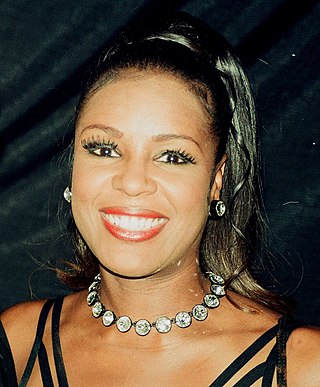
Angela Lisa Winbush is an American R&B/soul singer-songwriter, musician and record producer who rose to fame first in the 1980s R&B duo René & Angela, also scoring hits as a solo artist. To date, Winbush has sold over 10 million albums and singles worldwide.
"That's the Way Love Is" is a 1967 Tamla (Motown) single recorded by The Isley Brothers and produced by Norman Whitfield.
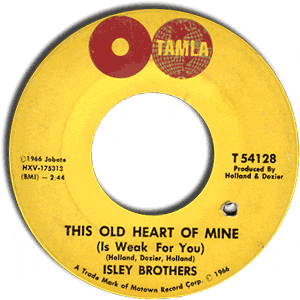
"This Old Heart of Mine (Is Weak for You)" is a Holland–Dozier–Holland song that was a hit for American musical group the Isley Brothers in January 1966 during their brief tenure on Motown's Tamla label. Featuring Ronald Isley on lead vocal, "This Old Heart of Mine" peaked at number twelve on the Billboard Hot 100, and at number six on the Billboard R&B Singles chart.

"It's Your Thing" is a funk single by The Isley Brothers. Released in 1969, the anthem was an artistic response to Motown chief Berry Gordy's demanding hold on his artists after the Isleys left the label in late 1968.
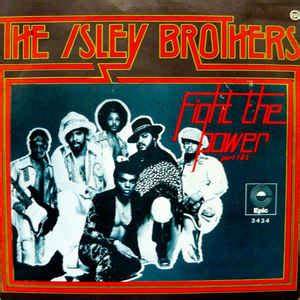
"Fight the Power" is a song recorded by the Isley Brothers, who released the song as the first single off their landmark album, The Heat Is On. The song is notable for the usage of the word bullshit, which was censored during radio airplay.
"Live It Up, Pt. 1 & 2" is a funk/rock song released by the Isley Brothers, on their album of the same name in 1974 on their T-Neck imprint.
"For the Love of You" is a song recorded by the Isley Brothers, who released the song as the second single off their 1975 album, The Heat Is On. The record showcased the two sides of the act, with the album's first single "Fight the Power" reflecting a fast-paced funk vibe while showcasing a ballad side on the latter. The song later became a crossover hit for the brothers.
"(At Your Best) You Are Love" is a song by R&B group the Isley Brothers. It was originally released on their album Harvest for the World. The song was dedicated to their mother, Sally. Although not a single, the song was a radio hit in 1976, and later became a hit for R&B singer Aaliyah in 1994.

Live It Up is the twelfth album by the Isley Brothers, released on September 7, 1974. It was their second major-distributed album with Epic Records under their T-Neck subsidiary.

The Heat Is On is the thirteenth studio album by American soul and funk group The Isley Brothers, released June 7, 1975, on T-Neck Records and Epic Records. Written and produced entirely by the group, the album was recorded in 1975 at Kendum Recorders in Burbank, California. The Heat Is On features musical elements of rock, and is divided between uptempo funk songs and soul ballads.

Go All the Way is an album by the Isley Brothers, released on their T-Neck imprint on April 19, 1980.

Between the Sheets is the 22nd album released by The Isley Brothers on their T-Neck imprint on April 24, 1983. The album is notable for the title track, the follow-up hit "Choosey Lover", and the ballad "Touch Me".
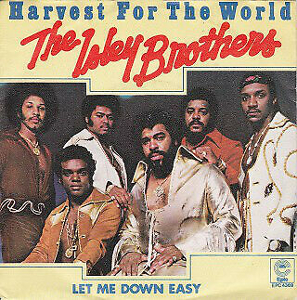
"Harvest for the World" is a 1976 single released by American musical group The Isley Brothers on their T-Neck imprint. It was the title track from their 1976 album Harvest for the World.
"I Turned You On" is a 1969 funk song by The Isley Brothers, released on their T-Neck imprint. The single was almost as big a hit as their predecessor, "It's Your Thing", reaching number six on the R&B chart and number twenty-three on the pop chart.
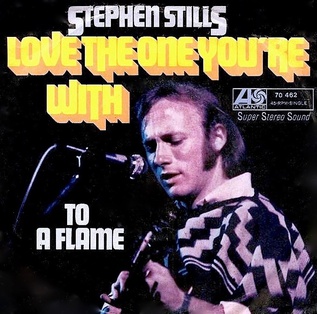
"Love the One You're With" is a song by American folk rock musician Stephen Stills. It was released as the lead single from his debut self-titled studio album in November 1970. The song, inspired by a remark Stills heard from musician Billy Preston, became his biggest hit single, peaking at No. 14 on the Billboard Hot 100 in early 1971. David Crosby and Graham Nash, Stills's fellow members of Crosby, Stills & Nash, provide background vocals on the song. Also providing the backups are Rita Coolidge, her sister Priscilla Jones, and John Sebastian. They all sing the "Do Dos" that come before the instrumental portion and the outro. The song was also recorded by the Isley Brothers, The Meters, Bucks Fizz, Luther Vandross, Bob Seger and Richard Clapton, among others.

"Summer Breeze" is a 1972 song by American soft rock duo Seals and Crofts. It is the title track of their fourth studio album, and was released as the album's lead single in August 1972. The song reached No. 6 on the US Billboard Hot 100 chart in the US. In 2013, it was ranked No. 13 in Rolling Stone′s "Best Summer Songs of All Time". The song also became a hit for the Isley Brothers in 1974.

"Down Low (Nobody Has to Know)" is an R&B song about infidelity by American singer and songwriter R. Kelly featuring The Isley Brothers, released in 1995 from Kelly's second and self-titled album (1995). The song peaked at number four on the Billboard Hot 100 and number one on the Billboard R&B Singles Chart for seven weeks, making it Kelly's fifth single to do so on the latter. It also gave the Isley Brothers their first Top 40 pop record since 1980's "Don't Say Goodnight (It's Time For Love)", and was Kelly's third top 5 pop record. The lyrics are from the perspective of a man who has an affair with another man's woman and tells her to keep their relationship a closely guarded secret.
"The Pride" is a 1977 funk song by The Isley Brothers, released on their T-Neck imprint. The song, which was the first single released from their album, Go For Your Guns, was written as a warning to politicians to be the leader that the people need and to others who want change reminding them that "the pride makes (them) feel that (they) belong". The song was one of several socially conscious political songs the Isleys recorded throughout the 1970s including "Fight the Power Pts. 1 & 2" and "Harvest for the World". While the song peaked at sixty-three on the pop charts, it reached number-one on the R&B singles chart becoming the group's third number one on the chart.

"It's a Disco Night " is a 1979 club hit for The Isley Brothers, released on their T-Neck label as the second single from their gold-certified album Winner Takes All. The song is notable for being one of the few disco-based songs the Isley Brothers released. Beforehand, the group were known for their mixture of funk, rhythm and blues and rock. The song was led by brother Ronald Isley while his brothers Kelly and Rudolph Isley chanted "rock don't stop" in the background. The song briefly charted on the Billboard Hot 100 peaking at number 90, hitting number 27 on the R&B chart. Outside the US, "It's a Disco Night" reached number 14 on the UK Singles chart.













